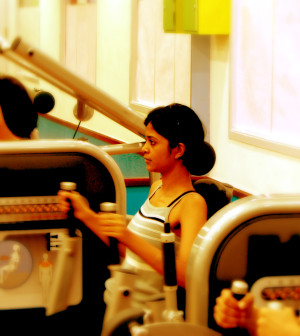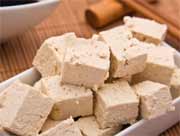- Could Your Grocery Store Meat Be Causing Recurring UTIs?
- Are You Making This Expensive Thermostat Error This Winter?
- Recognizing the Signs of Hypothyroidism
- 10 Strategies to Overcome Insomnia
- Could Artificial Sweeteners Be Aging the Brain Faster?
- Techniques for Soothing Your Nervous System
- Does the Water in Your House Smell Funny? Here’s Why
- Can a Daily Dose of Apple Cider Vinegar Actually Aid Weight Loss?
- 6 Health Beverages That Can Actually Spike Your Blood Sugar
- Treatment Options for Social Anxiety Disorder
Soy Foods Don’t Seem to Protect Against Uterine Cancer: Researchers


There’s no evidence that soy foods protect against uterine cancer, a large Japanese study reports.
Soy foods contain isoflavones, a plant-derived estrogen that some research suggests may be protective against cancer. But previous studies into how soy foods may affect uterine (endometrial) cancer risk have yielded inconsistent findings.
This new study included more than 49,000 Japanese women who were surveyed twice in five years about their diet, lifestyle, medical history and food consumption of eight soy food items, including miso soup, tofu and soy milk.
After five years, 112 of the women were diagnosed with uterine cancer. But the researchers found no association between higher consumption of soy foods and a lower risk of uterine cancer, according to the study, which was published June 18 in BJOG: An International Journal of Obstetrics and Gynaecology.
The researchers noted that the women who consumed more soy foods also ate more fruit and vegetables and tended to be older, more likely to have a history of diabetes, and less likely to be current smokers or to consume alcohol or coffee.
“Our study found that intake of soy and isoflavones were not associated with the risk of endometrial cancer,” study co-author Dr. Motoki Iwasaki, of the National Cancer Center in Tokyo, said in a journal news release.
“Although the incidence of endometrial cancer is much lower in Asian countries, the incidence rate has been increasing. We also know that the consumption of soy foods among Japanese people is very high,” Iwasaki noted.
“We need further studies with a greater number of cases to verify these findings and add to the research base,” the researcher concluded.
John Thorp, journal deputy editor-in-chief, added in the news release, “Confirmation of these results needs further investigation and larger, more diverse studies.”
More information
The U.S. National Library of Medicine has more about uterine cancer.
Source: HealthDay
Copyright © 2026 HealthDay. All rights reserved.










